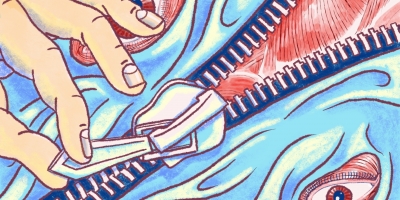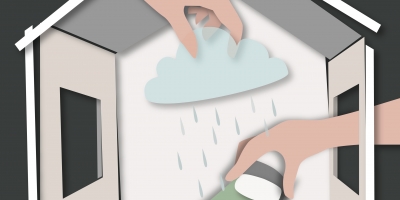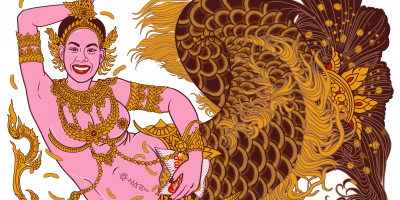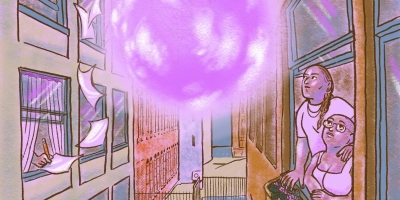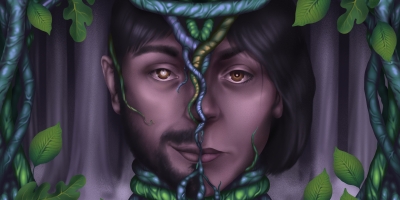Fiction
A Girl Draws a Picture
by Ruth Joffre

Every day, the drawing gets just a little more detailed: a trail winds up a mountain, a river roars down a falls, or a log blooms with fungi in a forest the size of my palm. Once, it was a gray ball hovering in the air outside her window, its surface smooth, its shading clearly done in pencil. We had no idea then that it was a planet. Not until she drew oceans and continents and ten moons orbiting like tennis balls in a child’s makeshift diorama of the solar system. When the nearby apartment buildings did not buckle and pigeons were not sucked down by the planet’s gravity, we figured that the drawing had a physics all its own and would not destroy us. From the safety of our apartment, we allowed ourselves to wonder: What will the girl in the building across the street draw next?
“A hot spring,” my wife theorizes, blowing on her coffee to cool it.
“A fire-breathing dragon,” I suggest, lighting a burner to fry eggs.
“I haven’t seen any animals yet. Maybe some chickens?”
“Graphite Guernseys.”
“Penciled pigs.”
Mornings are like this: indulgent. Between bites, we picture life in this drawing of a farm, where magnolias are always in bloom and horseflies have finally discovered the fertilizers. A trio of dogs runs around the fields and terrorizes the wild prairie chickens. My wife asks, “What do you think their names are?” and because their fur is grayscale and can only be seen through the eye of our spotting scope, I say, “Atom. Dewdrop. Gandalf.” One of the big dogs has an uncanny ability to camouflage itself in tall grasses. One second, its long, feathered tail is swishing back and forth under the crab apple trees, and the next it has disappeared into the reeds. I often see it emerge with a quail tucked into the hollow of its soft bird dog’s mouth. “Can you imagine living there?”
My wife shrugs and nods all at once. “It would be a lot quieter than the city.”
And a lot grayer, I imagine, even as I stare up at a sky full of skyscrapers.
“Just a sea of plaid,” my wife says, stretching her hand to the horizon.
“You would look good in a tool belt,” I say, as I put my hands on her hips, tucking the tips of my fingers under her shirt and stroking. I picture her in a flannel shirt and blue jeans, kicking up cud with her boots, reaching for her screwdriver as I try to hide my blush.
“You like it when I’m butch,” she says, passing a thumb over my lip.
Afterward, she says, “In all seriousness, I think I would enjoy living on a farm: growing a mess of vegetables, milking the cows.” Her whole face brightens at an idea: “I could finally build that treehouse you’ve always wanted.”
I snuggle deeper into her, imagining the battery-powered twinkle lights, the sleeping bags zipped together so we can slip inside them, skin to skin. I wish life could always be like this—the two of us snuggling up, our bodies tucked into a world of our own making—then Monday comes and brings with it a capitalist conception of time. Hours pass in which we say nothing even when we sit side by side, staring at our respective work computers. Every so often, one of us will stand up and ask, “Do you want tea?” or peer out the window and say, “Look.”
“You have to see this.” My wife waves me over, then points to a drawing of a UFO.
Upon closer inspection, this flying picture is revealed to be a rocket en route to the planet. Once it lands, a miniature replica of the artist herself emerges from the craft, wearing an astronaut helmet and wielding magical colored pencils that never need to be sharpened or replaced. For the next few hours the girl walks around, meticulously coloring in every blade of grass, every clod of brown dirt, every glittering beetle on a log adorned with frosty bonnet mushrooms; but even then only a fraction of the world has been redone. After coloring a particularly intricate caterpillar, the artist’s avatar plunks down on the ground and sinks into a peaceful slumber.
Her creator is gone. Her window seat, empty.
We know nothing about her. Have never run into her family at the corner store, chatted at the bus stop down the street. Her life would be a blank slate if not for this planet, its idyllic fields and charming meadows. Without speaking, we think we know why she has created it. Who in the city hasn’t dreamed at one point or another of packing up, taking off, driving to a place where the air is fresh and clean and you can walk along the trails, calling everything by its right name, until you realize that you don’t own land, that you could never even afford to rent it with the mountain of student loan debt and credit card debt and medical debt keeping you shackled to the desk forty hours a week? For me it was a broken leg, a bad fall down a flight of stairs on a day when the ice and the crowd hit me at just the wrong angle. Now, I’m stuck at my laptop, doing my stupid little tasks at my stupid little job, and as I sit punching at the keys I forget temporarily about Atom and Dewdrop and the treehouse lined with lights; then, right before bed, I look up and catch the exact moment the avatar wakes. I watch her stretch and pull a leaf out of her hair before picking up her colored pencils and beginning again, as if she had never stopped, as if indeed she has all the time in the world.

